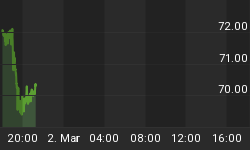Since taking over as the head of the Federal Reserve in 2006, Ben Bernanke has continually taken actions that have been unpopular and proven to be wrong for the US economy. His monetary policy is terrible, he has failed to adequately stimulate the US economy to recover after the 2008 crash, and his stance on bank bailouts following that crash were senseless, anti-capitalist, and wildly disliked.
Bernanke has maintained low interest rates since the credit crisis, and announced last week that rates would remain low for "an extended period of time." The problem with this strategy is that it isn't working. Cheap money has not only failed to create the jobs this economy needs to stage a real recovery; it has also sparked the public's fears of inflation, unfounded as they are.
It should come as no surprise, then, that Bernanke's goal is not, nor was it ever to help the economy.
The United States Congress, and the American people, out of need for guidance and plausible deniability, has assigned to the Fed the objective of protecting the value of the US dollar and supporting the domestic economy.
As nice as that sounds, and as much sense as it would make for the nation's best economists to set monetary policy that will shepherd the American economy - it simply isn't true. Though admirable, this is not the Fed's purpose.
The Federal Reserve was founded by several of this country's largest banks and remains privately owned to this day. It's no more federal than Federal Express; and its goal is simple: To protect those banks that own it. Like any other corporation its aim is to produce profit for shareholders, not to serve some altruistic greater good.
Strangely, when Bernanke's Fed is examined through this lens it is remarkably successful. In the credit crisis of 2008 it helped prevent the failure of several of its shareholder banks, while at the same time encouraging the consolidation of a great deal of their smaller competitors. Through these strategic acquisitions and other policies described below the banks are making money hand over fist, all thanks to Fed Chairman Bernanke.
The Fed has also assisted its shareholders in acquiring the assets of many of these smaller, less "stable" banks for mere pennies on the dollar. Bernanke's policy of low interest rates has allowed big banks to borrow money from the American people for next-to-nothing.
What's more, they can then deposit this borrowed money back into the Federal Reserve System, where Bernanke pays them interest on excess reserves - interest that, in fact, exceeds their cost of borrowing. In other words, big banks are being paid interest on money that isn't even theirs, for which they assume almost zero risk.
So, with a nice risk-free profit margin being made on money that isn't even theirs, what reason do the banks have to loan money into the public that would help with the recovery of the US economy?
Many people consider these to be bad policies, and from where they sit it's hard for us to disagree. However, while it can be hard, it's important to remember when looking at economics that the circumstances we face are not inherently good or bad. The ways in which those circumstances impact us as individuals are what ultimately determines our perceptions of them as positive or negative.
The same goes for politics. Most readers are abundantly aware that we are not particularly fond of President Obama. We simply have fundamental disagreements about the direction of this country and the role of government that cause us to dislike many of his policies.
As much as we disagree with Obama's policies, it's hard to consider them inherently bad when we're making so much money during his term. In fact, in the past 12 months we've had some of the best returns since opening our doors more than 30 years ago. So it's hard to be mad at Obama.
We are not fatalists. We may disagree with a President or a Fed Chairman, but we certainly don't believe that the United States is in the midst of collapse. One problem many investors have encountered is that they've been halted by their own fear. They have been convinced that the world is coming to an end, and in fleeing the markets they have missed some phenomenal gains. They would have been far better off if they put their own beliefs aside and dealt with the markets objectively. Instead, they now find themselves behind and trying to catch up.
















